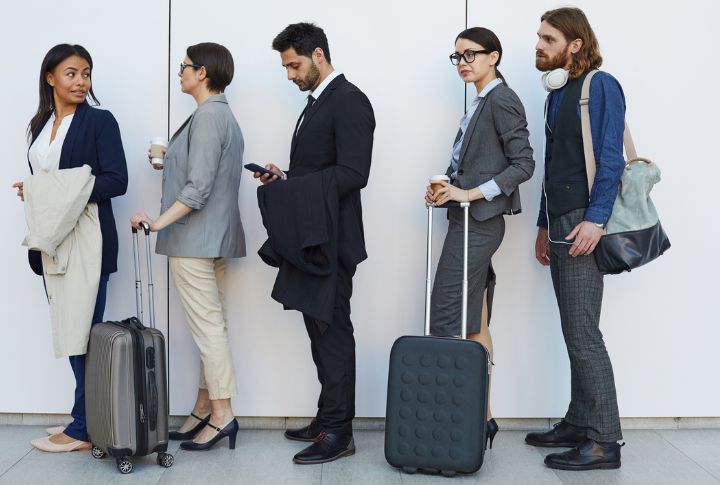
Being classy isn’t just about wearing the right clothes or knowing which fork to use at dinner; it’s about demonstrating respect, consideration, and good manners in everyday interactions. Certain behaviors, often overlooked, can make a person come across as uncouth or rude, tarnishing their image regardless of how well-dressed they might be. Let’s discuss 15 rude behaviors that show you’re not classy:
Poor Table Manners

Table manners are a clear indicator of one’s upbringing and consideration for others. Chewing with your mouth open, speaking with a full mouth, and making loud noises while eating are glaring signs of poor etiquette. Using utensils improperly, reaching across the table instead of asking for items to be passed, and not thanking the server or host is an additional faux pas.
Interrupting Others

Cutting someone off mid-sentence is a surefire way to show a lack of respect and patience. This behavior indicates that you value your words more than theirs, which can be perceived as arrogant and dismissive. A classy individual listens actively, waits for their turn to speak, and acknowledges others’ contributions to the conversation.
Excessive Phone Use

Constantly checking your phone during a social gathering is not only rude but also signals that you’re disinterested or disrespectful of others’ time. Whether you’re dining out, attending a meeting, or catching up with friends, putting your phone away and giving your full attention to those around you shows consideration and good manners.
Being Late

Arriving late to appointments, meetings, or social events without a valid reason can inconvenience others and suggest that you don’t value their time. A classy individual plans ahead, communicates any delays promptly and strives to arrive on time.
Talking Loudly in Public Spaces

Speaking loudly in public spaces, whether on the phone or with companions, can be incredibly disruptive to others. It shows a lack of consideration for those around you. Being mindful of your volume, especially in quiet settings like libraries, theaters, and restaurants, demonstrates respect for others’ space and peace.
Not Acknowledging Others

Failing to acknowledge people you interact with, such as cashiers, waitstaff, or colleagues, can come off as snobbish or ungrateful. Simple gestures like making eye contact, smiling, saying please and thank you, and using names when appropriate go a long way in showing respect and appreciation.
Lack of Cleanliness

Being unkempt, having bad breath, or wearing dirty clothes can be off-putting and suggest a lack of self-care. Moreover, leaving a mess behind, whether it’s littering in public places or not cleaning up after yourself, shows disregard for shared spaces and the people who maintain them.
Ignoring Social Cues

Social awareness is key to interacting gracefully with others. Ignoring body language, personal space, and social context can lead to awkward and uncomfortable situations. For example, standing too close to someone, failing to notice when someone wants to end a conversation, or oversharing personal information are signs of poor social etiquette.
Bragging or One-Upping

Constantly bragging about your achievements, possessions, or experiences, or trying to one-up others in conversation, can be tiresome and off-putting. It depicts insecurity and a need for validation.
Gossiping

Engaging in gossip not only hurts others but also damages your reputation. Talking behind someone’s back or spreading rumors can create a toxic environment and indicate a lack of integrity. A classy person refrains from gossip, maintains confidentiality, and speaks positively about others.
Not Taking Responsibility

Refusing to take responsibility for your acts and blaming others instead is a major sign of immaturity and a lack of class. Whether it’s a mistake at work or a personal oversight, owning up to it and apologizing sincerely shows integrity and accountability. Passing the buck or making excuses not only diminishes your credibility but also erodes trust.
Cutting in Line

Cutting in line is a blatant display of entitlement and disregard for others. Whether at the grocery store, a coffee shop, or any public place, waiting your turn is a basic aspect of respect and fairness. One should respect the order and patiently wait, understanding that everyone’s time is equally valuable.
Being Rude to Service Staff

Treating service staff poorly, such as being dismissive, condescending, or demanding, reflects badly on your character. Service staff work hard and deserve respect and courtesy.
Dominating Conversations

Monopolizing conversations and not allowing others to speak is a sign of self-centeredness and poor social skills. Dominating conversations can make others feel undervalued and ignored.
Disregarding Dress Codes

Ignoring dress codes for various events or settings shows disregard for the occasion and the people hosting it. Dressing appropriately demonstrates awareness and respect at formal events, business meetings, and casual gatherings.
